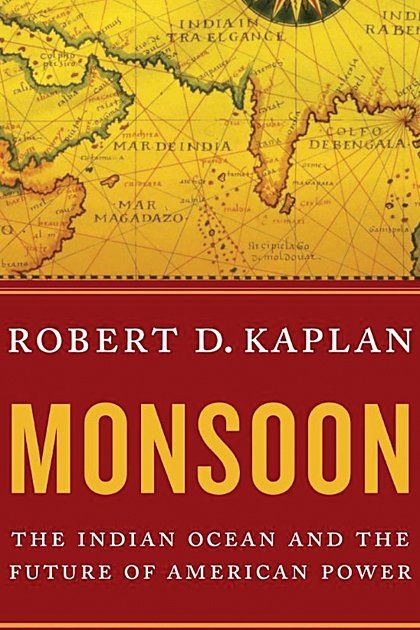
Foreign policymakers distracted by recent history—the fallout from the end of the Cold War, the morasses of Iraq and Afghanistan—should shift their gazes from northern landmasses to southern seas. That's the thrust of Robert Kaplan's new book, Monsoon: The Indian Ocean and the Future of American Power, which argues that the Indian Ocean "will demographically and strategically be a hub of the 21st-century world."
Kaplan, who has written prolifically on how geography plays into national destiny, takes the "rise of the rest" theory one step further in Monsoon. It's not just the BRICs that are worth watching, he says, but the whole ocean and its rimland, from Indonesia to the Horn of Africa, which is lined with billions of people in dozens of countries. The area already accounts for 70 percent of the world's traffic of petroleum products, and it will be the setting for the new Great Game between China, India, and the U.S., as each country vies for naval dominance of its waters. Forget Europe and Russia; it is the Indian Ocean's rim, says Kaplan, that will be the epicenter of the next generation of global issues, including climate change, access to energy, and extremist politics.
On its far West lies Somalia, the anarchic state responsible for piracy on Indian Ocean shipping lanes; on the far East, Indonesia, whose democracy "could become the lodestar of the Muslim world" and whose nearby Strait of Malacca "hosts" 50 percent of the world's merchant fleet capability. As America's influence slowly shrinks worldwide, the U.S. will have to engage these rim countries in order to legitimize its power in the region.
Engaging with this new hub also means being realistic about China's rise. Kaplan takes a skeptical view of America's "hyperventilat[ion] over China," he said in a recent interview with NEWSWEEK. China will build a strong Navy, he writes, "not only of hard but of soft power as well: to help protect the global commons and a trading system for the benefit of all." Despite all the ink spilled over China's growing aggressiveness, he sees the Chinese Navy as rising "in a legitimate matter, to protect economic and rightful security interests as America's has done, rather than to forge a potentially suicidal insurgency force at sea, as Iran's Islamic Revolutionary Guard Corps Navy appears bent on doing in the Persian Gulf."
Kaplan compares China's rise with that of the U.S. in the years between the Civil War and World War I. "Our economy started growing every year as dynamically as China's does now, and as a consequence we started to trade with the world in the same way China does now," he says. Symbolically, China's absorption of Taiwan would be equivalent to America's final pacification of the Native Americans, in that it would be the moment when China no longer needs to focus on its own territorial concerns and begins looking outward in earnest.
In this emerging region, New Delhi will compete with Beijing for influence. China has built bunkering facilities in Sri Lanka, ports in Pakistan, and roads in Burma; all projects extend China's reach into India's sphere of influence, safeguard its investments, and assist it in transporting resources back into the mainland. For its part, India is also rapidly expanding its Navy. "India's rise in and of itself, even if it remains equidistant from the U.S. and China, benefits the U.S., because it acts as a counterweight even if it doesn't lean towards the U.S.," says Kaplan. Yet despite Delhi's relationship with Washington, "one cannot caution enough how subtly this game will have to be played, for India will never officially join the United States in any anti-Chinese alliance the way Japan joined the United States in an anti-Soviet one during the Cold War," Kaplan writes. Currently, the seaboard of the Indian Ocean lacks a superpower, which makes it, says Kaplan, a very "future trending" place indeed.
Uncommon Knowledge
Newsweek is committed to challenging conventional wisdom and finding connections in the search for common ground.
Newsweek is committed to challenging conventional wisdom and finding connections in the search for common ground.





